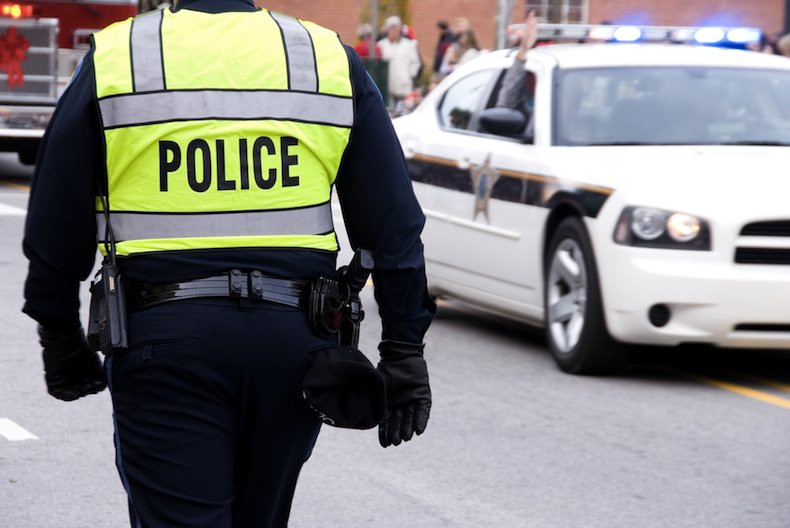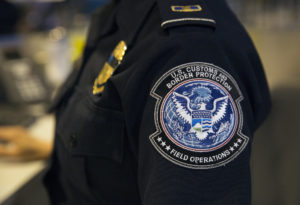Putting the Police Under Surveillance
In some places in America, a black man holding a toy gun or a banana is more likely to be shot by the police than a white man with an actual gun. We live in a country of lethal fruit. Shutterstock
Shutterstock
By Thor Benson
In some places in America, a black man holding a toy gun or a banana is more likely to be shot by the police than a white man with an actual gun. We live in a country of lethal fruit.
The recent killings of Eric Garner and Michael Brown are now widely considered tragedies in the American spirit, as people cry out for explanations of why they were slain, but tragedies can offer possible solutions. The company that created what we call the Taser, TASER International Inc., has a product that could curtail excessive police reactions to seemingly harmless actions by residents.
Companies such as TASER and Vievu offer body-mounted cameras that can be, and indeed already have been, administered to police departments to record officers’ actions and potentially provide evidence of police misconduct when it occurs. We can now monitor the people who monitor us.
Say what you will about tasing, but being electroshocked is far superior to being shot to death. Body-mounted cameras offered by the very company that created Tasers present their own risks and benefits as well, but an accurate record of a police-civilian interaction could help resolve the sometimes mysterious circumstances that end in the death of a person who seemed to present little threat to the officer involved.
Most police departments don’t see high-profile cases like what happened with Garner and Brown, but TASER and Vievu have developed products that can possibly prevent such behavior from going unpunished in places where it may occur — or perhaps act as a deterrent before it happens.
TASER’s Axon Flex is a new Google Glass-like product that records audio and video from a camera on the side of an officer’s head. Additionally, TASER has released a website called Evidence.com that will serve as a database where video footage can be stored and organized. Videos that are related to ongoing cases will be kept indefinitely, whereas videos that are deemed irrelevant will be deleted within six months. Vievu offers a similar camera that is mounted on the body and records from chest level.
Recorded police interactions could be used to prove that a police officer employed excessive force or violated the law; the footage could also be used to demonstrate that a claim of such behavior was false. But for Americans concerned about surveillance, police officers outfitted with video cameras could be seen as a violation of privacy, particularly when it comes to homes and other private spaces.
“We have supported the installation of video cameras on police car dashboards, in prisons, and during interrogations,” Jay Stanley, a senior policy analyst with the ACLU’s Speech, Privacy and Technology Project, wrote in October. That said, Stanley and the ACLU are concerned about the privacy risks and possible failures associated with the use of this kind of technology.
The ACLU’s proposed solution is to prevent police from turning off cameras when they don’t want certain action to be recorded. Stanley and his colleagues also believe people should be notified if video will be taken and that there should be rules for situations in which a police officer is required to record, such as during the pursuit of a suspect. They propose that officers accused of misconduct could have missing footage used as evidence against them.“People act differently when they know they are on camera,” Sydney Siegmeth, public relations director for Evidence.com, told Truthdig. She added that the company’s first study of police activity — now that body cameras have been purchased by more than 1,200 police agencies in the U.S. — took place in Rialto, Calif. The one-year study, conducted in cooperation with Cambridge University, found that police conduct complaints fell by 87.5 percent and use of force reports fell by 59 percent since the Rialto department started using officer-mounted cameras. Those are good numbers, but in terms of maintaining privacy, Siegmeth said, “policies have to be developed before you start wearing [body-mounted cameras], and we leave that up to each agency to develop their own policies.”
TASER’s executive vice president of marketing and communications, Luke Larson, told Truthdig that people are constantly under surveillance when they’re in a metropolitan area anyway, so conducting such surveillance in public shouldn’t present much concern. Big Brother’s been watching for a while, basically. Larson also mentioned that TASER doesn’t have an official opinion on how surveillance should be handled in private interactions, but the company does endorse the ACLU’s recommendations.
Even when police officers are convicted of misconduct, only 36 percent of them spend any time incarcerated, according to a Cato Institute report. NYPD Officer Daniel Pantaleo, who put a chokehold on Garner that led to his death, is unlikely to serve jail time, and the same could be true for Officer Darren Wilson, who shot and killed Brown.
Police cameras could be a useful tool to aid in the convictions of offending officers, but adequate pressure from the public must also continue. Considering that more than half of black Americans think Wilson should be convicted of murder but only 17 percent of whites do, according to a Rasmussen survey conducted last week, this is clearly an ongoing cultural battle. Thankfully, many black Americans are rising up against a society that allows them to be killed for selling cigarettes or walking in the street, but it remains to be seen whether those not in danger will join the struggle.
Thor Benson is a traveling writer who currently lives in Los Angeles. He has written for Slate, Vice, Fast Company and many others. Follow him at @thor_benson.
Your support matters…Independent journalism is under threat and overshadowed by heavily funded mainstream media.
You can help level the playing field. Become a member.
Your tax-deductible contribution keeps us digging beneath the headlines to give you thought-provoking, investigative reporting and analysis that unearths what's really happening- without compromise.
Give today to support our courageous, independent journalists.






You need to be a supporter to comment.
There are currently no responses to this article.
Be the first to respond.